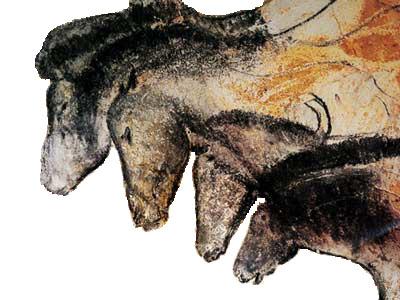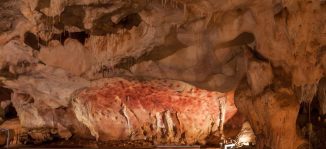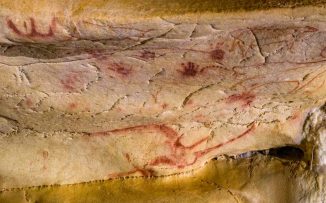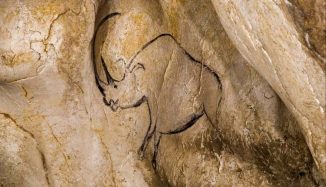Happy Birthday to Brad Pitt who was born 60 years ago today in Shawnee, Oklahoma. In his early days, the actor starred in A River Runs Through It, and 12 Monkeys—the sci-fi flick that earned him his first Academy Award nomination. Some of your faves may be Fight Club, the Ocean‘s franchise, Burn After Reading, or Inglourious Basterds, but Pitt received his second and third Oscar nominations for The Curious Case of Benjamin Button and one of the best baseball movies, ever—Moneyball. READ about his production work and WATCH some of his best scenes… (1964)
 2017 Photo by Dick Thomas Johnson, CC license
2017 Photo by Dick Thomas Johnson, CC licenseHe also produced The Departed and 12 Years a Slave, both of which won the Academy Award for Best Picture. He produced The Tree of Life, Moneyball, and The Big Short, as well, which all garnered Best Picture nominations. In 2019, the philanthropist who has donated many millions to charities starred opposite Leonardo DiCaprio as Cliff Booth, a stunt double, in Quentin Tarantino‘s upcoming film Once Upon a Time in Hollywood loosely about the Manson Family murders.
MORE Good News on this Date:
Happy 78th Birthday to Steven Spielberg, one of the most popular and successful movie producers in film history. Bullied as an Orthodox Jew growing up in Phoenix, Arizona, Spielberg made adventure films with his father’s 8mm movie camera—and at 16, wrote and directed his first independent film.
He’s now the highest-grossing director in history, with revenues from all Spielberg-directed films exceeding $9 billion worldwide. He won 2 Oscars for Best Director for Schindler’s List and Saving Private Ryan, and made blockbuster films like Jaws, E.T., Back to the Future, Raiders of the Lost Ark, and Jurassic Park, breaking box office records.
In later years, he co-founded DreamWorks Studios, and began addressing historical issues in films like The Color Purple (1985), Empire of the Sun (1987), Amistad (1997), Munich (2005), War Horse (2011), Lincoln (2012), Bridge of Spies (2015), The Post (2017), and a new version of West Side Story, just released. Check out the good news stories about Steven Spielberg on GNN. (1946)
 2016 Photo by Georges Biard, CC license
2016 Photo by Georges Biard, CC license
29 years ago today, the Chauvet-Pont-d’Arc Caves were discovered in southern France containing remarkable cave paintings that are roughly 32,000 years old, the earliest-known and best-preserved cave art and engravings in the world.
The site, located on a limestone cliff above the former bed of the Ardèche River, was first explored a few months after an opening in the Chauvet Cave was discovered. In addition to the paintings of lions, deer, horses, and rhinoceros, other human evidence was discovered from the Paleolithic era, including fossilized remains, footprints, and markings from a variety of animals, some of which are now extinct.
Three speleologists (including Jean-Marie Chauvet—for whom it was named) found evidence of human occupation about 26,000 years ago left by a child’s footprints, which may be the oldest human footprints that can be dated accurately. After the child’s visit to the cave, evidence suggests that a landslide covered its historical entrance and the cave remained untouched until it was discovered in modern times.
 From the virtual tour at archeologie.culture.fr
From the virtual tour at archeologie.culture.frThe soft, clay-like floor of the cave retains the paw prints of cave bears along with large, rounded depressions that are believed to be the “nests” where the bears slept. Fossilized bones are abundant and include cave bears skulls and the horned skull of an ibex. The set of child’s foot prints was alongside a wolf or dog walking next to it, suggesting the origin of the domestic dog could date to before the last ice age.
 Alcove of the Lions – archeologie.culture.fr
Alcove of the Lions – archeologie.culture.frHundreds of animal paintings have been catalogued, depicting at least 13 different species, including predatory animals like leopards, bears, and cave hyenas, along with a few panels of red ochre hand prints and hand stencils made by blowing pigment over hands pressed against the cave surface.
 Hand prints and red rhino – archeologie.culture.fr
Hand prints and red rhino – archeologie.culture.frThe artists who produced these paintings used techniques rarely found in other cave art. Many of the paintings appear to have been made only after the walls were scraped clear of debris and concretions, leaving a smoother and noticeably lighter area upon which the artists worked. Similarly, a three-dimensional quality and the suggestion of movement are achieved by incising or etching around the outlines of certain figures, like an owl. The art is also exceptional for its time for including “scenes”, e.g., animals interacting with each other; a pair of woolly rhinoceroses, for example, are seen butting horns in an apparent contest for territory or mating rights.
 Extinct woolly rhinoceroses butting heads – archeologie.culture.fr
Extinct woolly rhinoceroses butting heads – archeologie.culture.frThe cave has been sealed off to the public since 1994, after the damage that other decorated caves, such as Altamira and Lascaux, experience when visitor tours led to the growth of mold on the walls that damaged the art.

A facsimile of Chauvet Cave is open to the public. Opened in 2015, it is the largest cave replica ever built—and the art is reproduced full-size in a condensed replica of the underground environment. A few kilometers from the actual cave, in a circular building above ground visitors’ senses are stimulated by the same sensations of silence, darkness, temperature, humidity and acoustics. And, now anyone can take a virtual tour of the cave, made from 3D imagery, at archeologie.culture.fr/chauvet. (1994)
SHARE the Memories, Milestones, and Movies…
Source link

